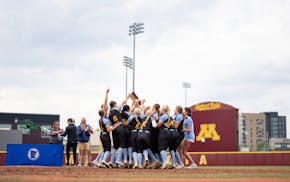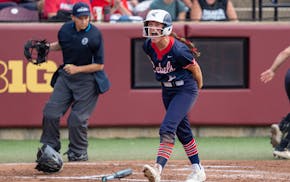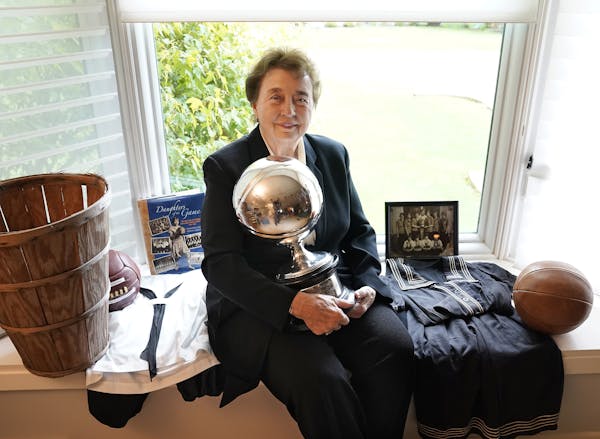Cheryl Reeve was a 5-year-old New Jersey kid playing baseball with the boys because there was no girls' softball to be found. Such was life on June 23, 1972, the day President Richard Nixon signed Title IX legislation into law.
No one, especially this young righthanded hitter, knew what this new law would bring.
"At 5, 6, you don't know things,'' said Reeve, coach and general manager of the Lynx.
She has coached four WNBA champions and won two Olympic gold medals. Fifty years ago who could have imagined this?
Not Reeve.
"You don't realize it when you're 6, or 10, or even 16,'' Reeve said. "But the opportunities I had. To play basketball at a great institution like La Salle. I was just a lover of sports. Now, as I've gotten older, I've thought about all the other [women] who didn't have the same opportunities. There is no question that, without Title IX, I'm not sitting here as a professional basketball coach.''
As Title IX turns 50, we look at its impact on a grand scale. Participation numbers, financial commitments, growth of high school and college sports. Let's also look at one life.
“It's the people I had a chance to work for that led to some great things and opportunities. I do feel fortunate.”
Reeve, 55, is an example of the first generation of women whose life was changed simply by opportunity. She was able to be a three-sport athlete in high school (by the way, softball was her best sport). She was able to play college basketball (on a partial scholarship at first; change sometimes comes slowly), where she still can be found on several La Salle all-time career lists. She was able to begin her coaching career in college, then move to a fledgling WNBA, a league she has been a part of for 22 of its 26 seasons.
Timing, it seems, is everything.
"I thank God I wasn't born 20 years prior,'' Reeve said. "Because I would have been in jail for the way they treated women, the lack of opportunities.''
Changemakers
If today's young women take some sports opportunities for granted, Reeve is old enough to realize how much things have changed. Plus, when it comes to this issue, Reeve is a historian.
She knows the stories of legendary Tennessee coach Pat Summitt having to coach, wash the team's uniforms and drive the team bus. She is aware of the journey taken by someone like Lin Dunn, who was born 20 years before Reeve. Dunn's junior high coach used to sneak the team across state lines to Tennessee to play because it was illegal for girls to play in her native Alabama.
All that was starting to change by the time Reeve approached middle school and high school. But Reeve says that it's not just the timing that helped her get where she is. It's the people she met along the way.
"I say that a lot,'' she said. "It's the people I had a chance to work for that led to some great things and opportunities. I do feel fortunate.''
A $5,000 salary
Washington Township High School is in Sewell Township, N.J., just 13 miles from Philadelphia. Reeve thrived in softball and loved tennis but in the early days of Title IX, basketball was one of the first sports to see a funding bump at the college level.
Reeve was gently pushed toward hoops. In those days, players would sit down and write letters to colleges and send them off with some clips.
But that wasn't how Reeve wound up playing college ball. Her high school team had five starters who would play Division I sports. Among them was a young phenom named Karen Healey, who would go on to star at Villanova. Reeve got noticed because college coaches came to watch Healey.
"That's how I got an opportunity to play at La Salle,'' Reeve said.
That started things. Acceding to her father, Reeve studied computer science at La Salle. Her parents wanted her to go to into that field.
But coaching was an idea taking hold. Each summer she would work as a counselor at the Cathy Rush camps, where she got an inkling of the rush that comes with helping someone succeed. She spent two years as a graduate assistant at La Salle while she got her master's degree. From there she went to George Washington, where she was an assistant for Joe McKeown for five years. Then it was on to Indiana State, where she was head coach for five years.
“I thank God I wasn't born 20 years prior. Because I would have been in jail for the way they treated women, the lack of opportunities.”
As a season-ticket holder for the brand new Indiana Fever, Reeve felt drawn to the WNBA. One spring she drove up to Chicago for the league's pre-draft combine. There she met Charlotte Sting coach Anne Donovan, who offered her a $5,000 job as a second assistant. She took it, before the 2001 season.
"Can you imagine that call home?'' Reeve said.
On the edge
Not much was easy about the WNBA's early days. Reeve was in Charlotte when the Hornets skipped town to New Orleans. Worried about the future of the Sting, Reeve went to work with Dan Hughes in Cleveland in 2003. But the Rockers were disbanded a year later. Reeve went back to Charlotte for two seasons, after which the Sting's head coach was fired.
About that time, Reeve's father, Larry, had been diagnosed with multiple myeloma.
"I was very close to not being in the WNBA anymore,'' Reeve said. "I had to make a decision. Each season was met with, I didn't know if the team would be there, if the league would be there. It's hard, because your family has to hear about your hardships. But I distinctly remember going, 'I'm in this thing. I'm going to go down with the ship if it goes down. Just do it. Obviously, things got better.''
Reeve went to Detroit to be Bill Laimbeer's assistant with the Shock in 2006. Over the next four seasons the Shock made three WNBA finals, winning two. On Dec. 8, 2009, Reeve was named head coach of the Lynx.
Climbing higher
There is more to do. Where does she see herself 10 years down the line?
"I hope it means ownership,'' she said. "That's probably what I would set my sights on. That I'm involved, still involved, but on a grander level. Impacting and being a participant in the opportunities that are available.''
It's a big goal. But possible, given talk of eventual WNBA expansion.
What a life arc. From playing baseball with the boys in 1972 to a basketball boss.
"That's what I hope for,'' she said. "We need more teams. Perhaps that will get there by the time I'm 70.''
. . .
Title IX at 50
An occasional Star Tribune series focused on gender equity in Minnesota sports. Read previous installments of our series at startribune.com/titleix.

St. Cloud Cathedral endures a tense start, defeats Hawley for Class 2A softball state title

Softball state tournament: Champlin Park (4A), Rocori (3A), St. Cloud Cathedral (2A), United South Central (1A) are champs

Champlin Park turns a big moment into the Class 4A softball championship

Rocori rolls past Byron in Class 3A for its first state title in 11 trips

